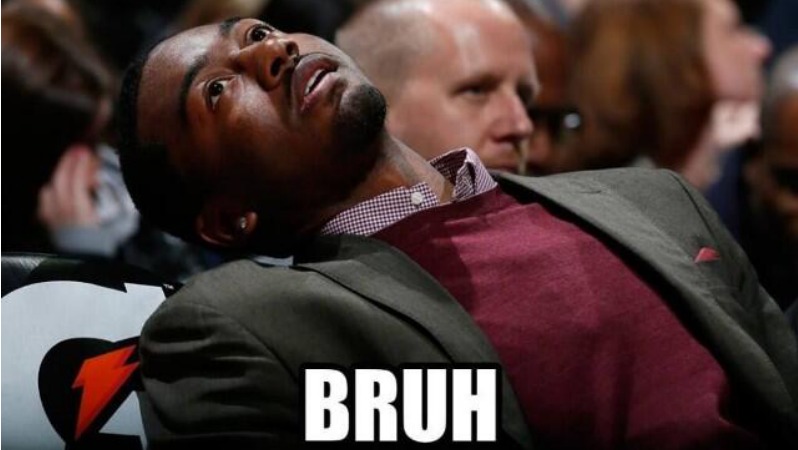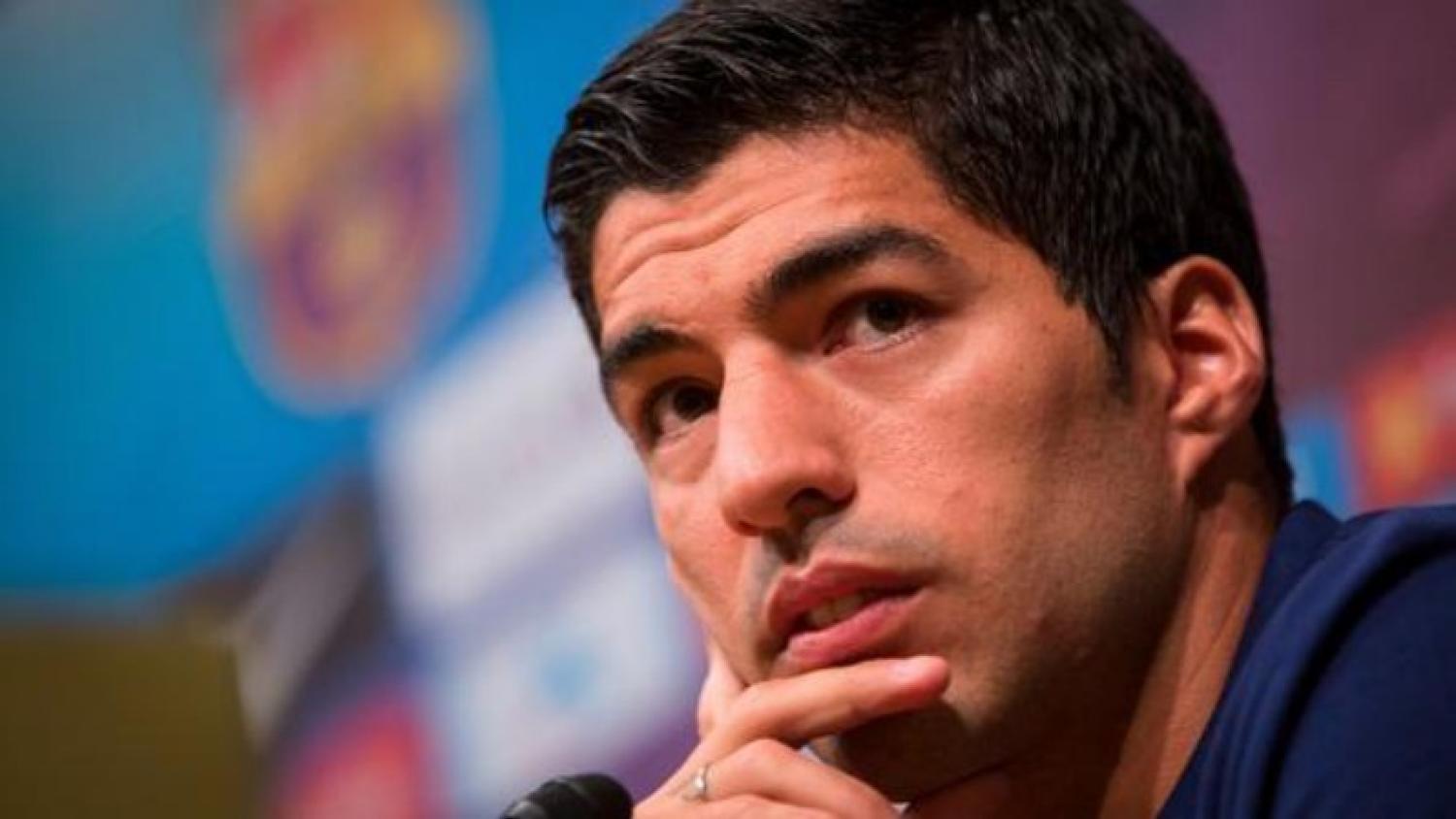In his new book, "Crossing the Line: My Story," Luis Suarez offers some insight into the mindset of the player so many of us have grown to admire - and so much of the media and general public loves to hate.
Upon reading his takes on the event, The18 was struck by how the lead up to, moment of, and aftermath of Luis Suarez’s bite on Chiellini fell inline with the 5 stages of grieving. Sparing you all a psychology lesson, the model consists of denial followed by anger, bargaining, depression, and acceptance; and it perfectly describes the controversial moment that arguably led to Uruguay beating Italy in this past summer’s World Cup.
Still with us? Good, because things are about to get very interesting. We present to you: “The 5 Stages of Luiz Suarez Biting Giorgio Chiellini.”
1. Denial

Photo: @itvfootball | Twitter
To understand the inception of what causes Luis Suarez to bite someone, we are going to take a philosophical leap courtesy of Wright Thompson, who wrote an amazing portrait of the Uruguayan striker. In his article, Thompson comes to the following conclusion:
“Basically, the theory goes, anything that threatens [Luis’] ability to score, and win, isn't processed in his subconscious as the act of a sportsman but, rather, as an act of aggression against his wife and his children. Watching him play certainly supports the idea because, when a defender presses close, Suarez doesn't respond as if the man is trying to take the ball. He reacts as if the defender is trying to send him back to the streets of [his hometown,] Montevideo, alone.”
Using that concept of retaliation as the lens through which we read his explanation of the mindset which led to him biting Giorgio Chiellini, we can start to see the tell-tale signs of denial.
“Moments before the Chiellini bite, I had a great chance to put us 1-0 up. If I had scored that goal, if Buffon hadn’t made the save, then I would not have done anything. But I missed the chance…All I could think was: ‘I didn’t score. We’re out of the World Cup…The fear of failure clouds everything for me…Logic doesn’t come into it.”
Nothing is more illogical than denial, it is the refusal to accept what has been shown to be true.
In the moments prior to him biting Chiellini, Suarez realized that his team could possibly lose, and he couldn’t believe it was happening. He refused to believe it was happening. And in a moment of personal denial, he decided that he would do what he needed to do to win the game: bite Chellini.
Suarez bit Chiellini in the 79th minute. Uruguay scored the game-winning goal in the 81st.
2. Anger

Photo: @HuffPostUKPics | Twitter
Even with denial, there is no denying that anger was the catalyst that turned a mindset into a violent action. If Suarez had responded to his denial with helplessness, he does not bite Chiellini and Uruguay does not win. But Suarez didn’t feel helpless, he felt angry.
“The pent-up frustration and feeling that it was my fault reached a point where I couldn’t contain it any more.”
“I could feel myself getting wound up. The adrenaline levels in a game can be so high; the pulse is racing and sometimes the brain doesn’t keep up,” Suarez says.
Athletic achievement often goes hand in hand with an athlete’s heightened ability to remove higher thinking from a situation, “don’t think, just play” is the adage that comes to mind.
“I’ve scored goals and later struggled to understand how exactly I managed to score them. There is something about the way I play that is unconscious, for better or worse."
Poetically, the very same mindset that makes Suarez such an amazing player is the one that made him see red instead of reason.
3. Bargaining

Photo: @milla_milla10 | Twitter
Faced with an onslaught of questions in the days immediately after the incident, Suarez tried to explain what happened.
“After the impact … I lost my balance, making my body unstable and falling on top of my opponent, at that moment I hit my face against the player, leaving a small bruise on my cheek and a strong pain in my teeth.”
Suarez himself probably did not believe these words as he said them. At least, we hope he didn’t, because absolutely no one else did.
4. Depression

Photo: @PurelyFootball | Twitter
“I had just become a father to a young daughter, Delfina, and the thought that she would grow up to see that I had done this upset me more than anything else.”
If this incident happened even 10 years ago, it could be argued that its legacy wouldn’t be quite so… well…
Time for this beauty again http://t.co/alPzGPFhpX
— Andy Rotheram (@AndyEFC1878) June 24, 2014
I'm loving the Suarez pics. This n the jaws one the best pic.twitter.com/vfei8aDu1i
— Darrell Peck (@Darrellpeck) June 25, 2014
— telegraph_sport (@telegraph_sport) June 24, 2014
Hey @luis16suarez. Next time you're hungry just grab a Snickers. #worldcup #luissuarez #EatASNICKERS pic.twitter.com/3RAO537HjW
— SNICKERS® (@SNICKERS) June 24, 2014
That last tweet was from Snickers. The company. Most people get down on themselves when they think about an awkward moment they had with a crush last week. Suarez’s bite makes those moments of reflection seem like a drop in the ocean. That is enough to make anyone depressed.
What is the over/under on the age at which Delfina learns how to use Google, and unlocks a pandora’s box of memes making fun of her dad? Seven?
5. Acceptance

Photo: @FCBarcelona | Twitter
“I’m already learning how to deal with these build-ups of pressure. I have always preferred to keep things to myself, rather than sharing them with anyone, but I am learning that if you let it go, you feel better for it. Don’t keep it all bottled up inside; don’t take it all on alone.”
The happy ending is right there in that quote, but until Luis Suarez retires from soccer, there will always be the chance that a reformed Luis Suarez will only ever reside in words, and not the real world.
No one knows if he will bite someone again. Chances are he probably won’t given the severity of the potential consequences and the devotion he has shown to change, but Suarez will always be a player that needs to lose himself in the game. Here’s hoping he doesn’t lose it all the next time he does so.



